Social Media Networking: Ur Doin' It Wrong
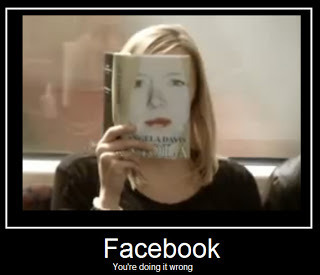 I have a confession to make. I have two LinkedIn accounts, two Pinterest accounts, two Twitter accounts, too many Facebook pages (and three accounts), and six e-mail accounts! Now, to be fair, I'm a self-professed geek and my writer sides are different (hence the two LinkedIn accounts). My gamer side doesn't want to mix game news and writing stuff. The part of me that is ADD requires the organization that comes from separating my various facets. It may sound chaotic, but for me, it's organized. It's kind of like how we, those of us with ADD, have piles of notes and notebooks. We know where to find everything, but it looks like a disaster to anyone else. Still, I'm fairly new to the concept of using social media for business purposes and what I've seen actually astonishes me.
I have a confession to make. I have two LinkedIn accounts, two Pinterest accounts, two Twitter accounts, too many Facebook pages (and three accounts), and six e-mail accounts! Now, to be fair, I'm a self-professed geek and my writer sides are different (hence the two LinkedIn accounts). My gamer side doesn't want to mix game news and writing stuff. The part of me that is ADD requires the organization that comes from separating my various facets. It may sound chaotic, but for me, it's organized. It's kind of like how we, those of us with ADD, have piles of notes and notebooks. We know where to find everything, but it looks like a disaster to anyone else. Still, I'm fairly new to the concept of using social media for business purposes and what I've seen actually astonishes me.Twitter: Imagine that you are at a party and everyone is talking at once. Everyone at the party has something that interests them to show you. The people are talking at you, but no one is talking to you or with you. This is what my writing feed looks like on Twitter. Everyone is talking to no one in particular. In fact, one of my game Twitter friends described Twitter as more of a bulletin board.
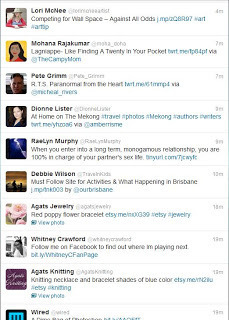 It kind of does appear that way, doesn't it? Yep, I'm in there, too, trying to get people to think about their relationships in a new way. The thing is, I'm following 108 people and have 70 people following me and no one's talking to anyone. My numbers are small, but the outcome is the same. It doesn't matter how many people are looking at your feeds, or even retweeting them, if no one is discussing the message. It's about conversations; it's not about metrics or links.
It kind of does appear that way, doesn't it? Yep, I'm in there, too, trying to get people to think about their relationships in a new way. The thing is, I'm following 108 people and have 70 people following me and no one's talking to anyone. My numbers are small, but the outcome is the same. It doesn't matter how many people are looking at your feeds, or even retweeting them, if no one is discussing the message. It's about conversations; it's not about metrics or links. By way of contrast, here is the twitter feed on my personal account:
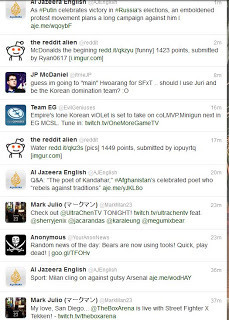 This feed is filled with newsy type stuff that matters to me today. (Yup, that's a direct reference to Philip DeFranco). It's also filled with chatter among people who matter to me. In this second one, you can see plenty of @mentions and, if you were able to scroll further down the page, you'd see actual conversations. For instance, JP McDaniel was asking Mark Julio a direct question about gaming.
This feed is filled with newsy type stuff that matters to me today. (Yup, that's a direct reference to Philip DeFranco). It's also filled with chatter among people who matter to me. In this second one, you can see plenty of @mentions and, if you were able to scroll further down the page, you'd see actual conversations. For instance, JP McDaniel was asking Mark Julio a direct question about gaming.I thoroughly enjoy this feed. I'm completely interested in the news feeds, even though they aren't speaking to me directly, because they are regarding subjects I'm interested in. I follow the conversations because they are part of the personalities of the people I'm following.
You see, I don't want to follow a bunch of blog links. Writer or not, I have plenty of things to read. I have more to read than I have time to read it in. My read-it-later bookmark list is 45 pages long! That's 450 articles I want to read "when I have time." What is it about the one you're linking that should make me want to go to it? If no one is talking back to me, at all, why should I retweet it? Who's going to go to it on my list?
Honestly, I appreciate everyone who follows me on Twitter. But, if I go to your feed and you've made no attempt to make conversation with anyone, I'm not going to follow you back. I want to, you know, network. I'm looking to make friends and influence people. I write my books and I keep this blog in the hopes that, someone, somewhere, will stumble upon it because they need the help I'm offering. It's not even for monetary gain. I sincerely want to help parents raise happy, successful, children with ADD. I want to help women, everywhere, have fulfilling long term relationships with their significant others. On Twitter, Facebook, and even on this blog, talking to me is free. But, no one is going to find me if my only audience is a bunch of authors who are just as interested in being heard, and just as overwhelmed with links they don't have time to read. The same goes for you. If your audience is only filled with other authors, you're spinning your wheels.
The problem is there are way too many articles that discuss following and being followed to build your base. These articles aren't limited to the Internet, itself. They're promoted on author forums on LinkedIn, Shelfari, and GoodReads. Author forums are filled with "like me and I'll like you back" threads. This is great if your target audience is authors. Authors are great readers and promoters. The problem is, if you're on one of these forums, you're busy trying to promote yourself!
Twitter does have a nice function to combat this: Lists. I use them.
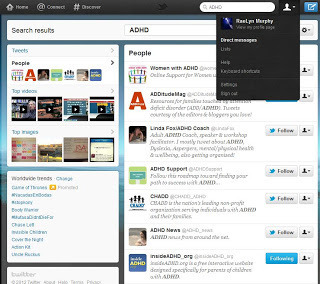 To make a list, go to the drop down menu next to your head symbol at the upper right side of the page. Below your name it says "View my Profile," "Direct Messages," and "Lists". Click on "Lists."
To make a list, go to the drop down menu next to your head symbol at the upper right side of the page. Below your name it says "View my Profile," "Direct Messages," and "Lists". Click on "Lists." 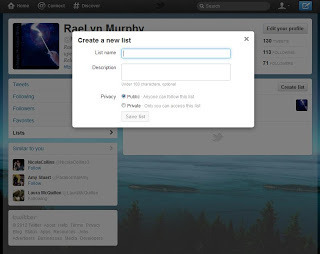
Click on the tab that says "Create List." In the pop up box, name your new list, provide a description for yourself if you want, and choose the radio button next to private or public.
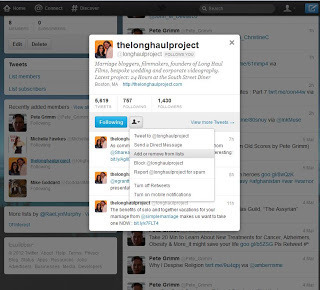
To add someone to your list, select the black head next to the "following" button, scroll down, and select "Add or Remove From List." A box will pop up, listing the names of your lists. Click on the box next to the list you want to add the person to. Now, when you want to find tweets from people you interact with or follow closely, all you need to do is go into your lists menu, choose the list, and all of the tweets from people on that list will show in your feed until you return to "home."
Facebook: As with Twitter, Facebook is about social connection. If you have a book page or an author page, your goal should be to build interaction. For the sake of discussion, pick a fan page you like. Pick any fan page, but try to find one with more than 1,000 followers. I picked on Philip DeFranco earlier, so I'll use that example again. Notice how the page interacts with the audience. In my example, he has added videos he likes, drawings he's doing, and pictures of himself with his interests. He's bringing his audience in and letting them be a part of his everyday doings. This is what your author page or book page should strive to do. Give people teasers from the book. Start telling a chapter one paragraph at a time. Ask people to help you pick a title. Start a contest for cover art. Make a poll, ask questions, start discussions. Make your page a community that people feel a part of.
LinkedIn: LinkedIn is more business networking than social. The groups are a great place to network, but this is the one place in which the community can, and should be, work-related. Seldom are people self-promoting in a void. This is generally the place to ask questions, offer answers, and get some answers of your own. To make the most of LinkedIn, join groups, create groups, and participate in group discussions.
Pinterest: Some people wouldn't consider Pinterest a true social networking site. It literally is a bulletin board of visual bookmarks. Complete strangers "like" your bookmarks and pass them on to their friends. It can be a great place to get your blogs noticed, but it's not really the place to make new friends and interact with people.
As an author, however, I find I learn a lot from my audience on Pinterest. You see, people have the option of following one item, a whole board, multiple boards, or all of your boards. If you write non-fiction and your boards are based on your interests as a writer--hopefully, you are writing about things that interest you!--you are getting built-in metrics about the things that are of greatest interest to your audience.
This does apply, with some finesse, to fiction authors, as well. If you're writing the next great lighthouse murder mystery, you might start a board pinning items that pertain to your subject matter. If your characters are inspired by a certain type of person, you may be pinning people or celebrities on a board. As people start to follow, you'll get an idea of what your audience is interested in and what bores them.
Pinterest is interesting because it doesn't come across as marketing. It's fun and addictive; it's non-personal and yet, friendly. Because it's non-invasive, I've found it to be the most important way to listen to my audience.
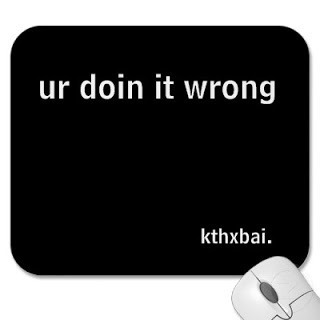
If you are using social media to build an audience and you're not interacting with that audience, I'm sorry but,
Your turn: What's the best interactive social media community experience you've ever had?

Published on March 06, 2012 22:22
No comments have been added yet.
RaeLyn Murphy's Blog
RaeLyn Murphy isn't a Goodreads Author
(yet),
but they
do have a blog,
so here are some recent posts imported from
their feed.





